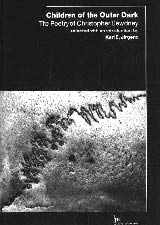Children of the Outer Dark by Christopher Dewdney
by Geoffrey Hlibchuck

The best work of Canadian poet Christopher Dewdney sadly remains out of print. This is particularly unfortunate given that a multitude of writers, both Canadian and international, continue to be fascinated and influenced by his writing. To this end, the new selected volume, Children of the Outer Dark, provides a valuable service by giving readers better access to much of Dewdney’s otherwise unavailable poetry.
Dewdney is most typically approached as a poet who attempts the integration of scientific discourse into his poetry. While this is undoubtedly true, nonetheless such an understanding somehow deemphasizes Dewdney’s ability to write devastatingly beautiful lines:
Tonight even the owls
are dreaming on the wing,
soundless flickering stains in
the dark sanctum of night’s night.
They break their predatory silence
with the eerie spectral address
of dream hunters.
Dewdney’s focus, here and elsewhere in this volume, seems more interested in the collisions between man and animal rather than in any detached scientific gaze that neatly preserves nature as a distinct object of study. He seemingly observes scientific data much less than he immerses himself within it:
I am counter-clockwise
and my vertebral column
is made from
the stacked
molars of mastadons.
I click, pivot and slide into
every step.
Elsewhere, Dewdney gives a ludic prognostication of fossil fuels which will “slowly replace the present composition of the atmosphere with the chemical composition of the atmosphere some 200 million years ago.” At such a time, the dead fossils that fuel our cars will have a chance at life again, returning themselves to the optimal conditions for their own survival. Here, Dewdney’s work acquires an ethical edge that seems not unrelated to the recent interest in ecocriticism.
Naturally, any selected volume of poetry falls prey to easy criticism. Needless to say, the selection here is somewhat questionable. Karl Jirgens, the editor, seems to privilege the later Dewdney, whereas critical work seems unanimous in finding his earlier, more experimental work to be more engaging. After all, it’s Dewdney’s earlier work, dripping with hallucinogenics and teeming with surrealist juxtapositions, which garnered him an international audience, so more of it would have been welcomed. Also, I was saddened to find no examples of Dewdney’s visual work, which otherwise are interspersed throughout all of his major texts. This absence is especially glaring given the inclusion of selections from Dewdney’s philosophical writings, which here seem a bit out of place. But though the collection may offer shortcomings, a republishing of Dewdney’s work can only be received graciously with open arms. And even while the book offers a quieter, more subdued side of Dewdney’s work, the reader will still be in for some surprises: For even when his writing is gently purring, it often belies the softest of growls.
|
Issue Navigation> Issue Index > v6n26: Recycle Your Cash (6/28/07) > Book Reviews > Children of the Outer Dark by Christopher Dewdney This Week's Issue • Artvoice Daily • Artvoice TV • Events Calendar • Classifieds |









 Current Issue
Current Issue